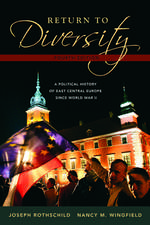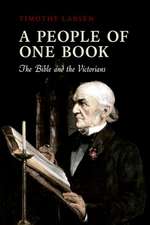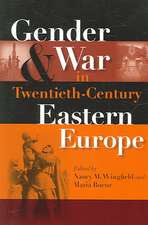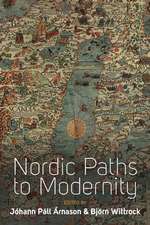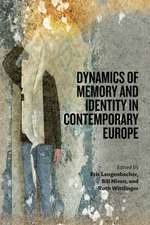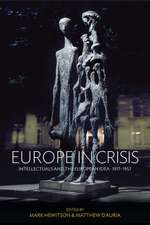Creating the Other: Austrian History, Culture & Society
Editat de Nancy M. Wingfielden Limba Engleză Paperback – 14 sep 2004
| Toate formatele și edițiile | Preț | Express |
|---|---|---|
| Paperback (1) | 260.57 lei 6-8 săpt. | |
| BERGHAHN BOOKS INC – 14 sep 2004 | 260.57 lei 6-8 săpt. | |
| Hardback (1) | 750.20 lei 6-8 săpt. | |
| BERGHAHN BOOKS INC – 20 oct 2003 | 750.20 lei 6-8 săpt. |
Preț: 260.57 lei
Nou
49.87€ • 51.87$ • 41.17£
Carte tipărită la comandă
Livrare economică 15-29 aprilie
Specificații
ISBN-10: 1571813853
Pagini: 272
Ilustrații: black & white illustrations
Dimensiuni: 152 x 229 x 15 mm
Greutate: 0.37 kg
Editura: BERGHAHN BOOKS INC
Seria Austrian History, Culture & Society
Notă biografică
Nancy M. Wingfield is Associate Professor of History at Northern Illinois University. She is the author of books and articles on Habsburg Central Europe.
Descriere
The historic myths of a people/nation usually play an important role in the creation and consolidation of the basic concepts from which the self-image of that nation derives. These concepts include not only images of the nation itself, but also images of other peoples. Although the construction of ethnic stereotypes during the "long" nineteenth century initially had other functions than simply the homogenization of the particular culture and the exclusion of "others" from the public sphere, the evaluation of peoples according to criteria that included "level of civilization" yielded "rankings" of ethnic groups within the Habsburg Monarchy. That provided the basis for later, more divisive ethnic characterizations of exclusive nationalism, as addressed in this volume that examines the roots and results of ethnic, nationalist, and racial conflict in the region from a variety of historical and theoretical perspectives.


